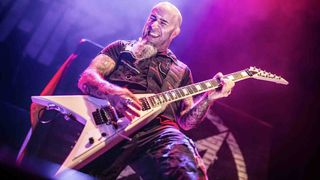
Introduction: Maiden voyage
The phrase ‘living the dream’ is a little overused these days. But for Scott Ian, it seems the only appropriate way of describing his current support slot with Iron Maiden.
“If it wasn’t for Maiden, I don’t know if we would have had Anthrax,” acknowledges thrash metal’s rhythm king, without a hint of overstatement. So, for a guitarist who grew up hero worshipping the British legends, getting to play to crowds of up to 60,000 fervid South Americans a night as part of their support band is very special.
Anthrax were even flying between gigs with the band in Maiden’s special Ed Force One piloted by Bruce Dickson, until the 747 was temporarily grounded in Chile earlier this month, following an unfortunate runway collision with a tow truck. But Scott can at least thank the country’s Santiago stop for giving him one of the greatest gig experiences of his career so far…
If it wasn’t for Maiden, I don’t know if we would have had Anthrax
“For us to get to play a show in Chile for 60,000 people opening for Maiden… the most we’ve ever played to in Chile before is probably 8,000 people headlining, so add on another 52,000! It really ramps it up, and then to get to see Maiden as a fan in front of their best audience was also kind of like a transcendent experience. I got to see one of my favourite bands in front of that crowd.”
It’s a fitting momentum for the thrash icons, who have been enjoying rude creative health since 2011’s comeback, Worship Music. The band have been airing two songs (Evil Twin and Breathing Lightning) from recently released follow-up, For All Kings, at these shows, and fans can expect more of the new material to be added for headline shows later this year. But choosing the cuts for his 10 album selection is a trickier subject to tackle with Scott.
“I don’t have a top 10 records list, because what’s the point of a top 10 albums list?” he reasons. “I like a thousand albums, I like a hundred-thousand albums…”
Here, then, are just 10 of many that have had an impact on the guitarist over the years.
For All Kings is available now on Nuclear Blast.
Don't Miss
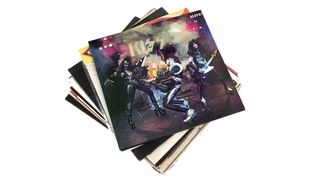
1. KISS - Alive (1975)
“I don’t know if it’s the first album I ever bought, but it was certainly early on. I heard Rock And Roll All Nite on the radio before I knew what they looked like and thought the song was amazing.
“And then it was not long after that, seeing them on TV, and still not knowing they were the band that played Rock And Roll All Nite until they actually started playing and then I thought, ‘Holy crap!' because when I first saw them it was on a talk show, and it would have been a daytime thing, because it wasn’t as if I was staying up late at night, and KISS wasn’t on Johnny Carson in 1975 or anything.
“So, I saw these guys sitting there and I didn’t get it at first and I think my initial instinct was, ‘What is this? This is weird to me.’ But then they started playing Rock And Roll All Nite, and that’s all it took. It was like heroin for kids at that time. Because they were horror and comic books and rock ’n’ roll all mixed up into one bloody package. It just kind of mainlined right to my brain.”
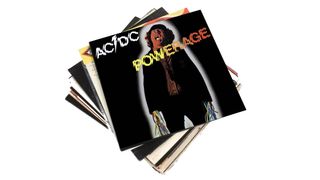
2. AC/DC - Powerage (1978)
“I first heard them in 1978 in the lunchroom of junior high school. Someone would have a little tape player and we would listen to music at lunchtime. Everyone was always bringing in new stuff that they would find or hear. I’m pretty sure the first song I heard was Rock 'N' Roll Damnation or Sin City, one of those two.
“I had never heard anything like it; I’d never heard anyone sing like Bon [Scott] before. There was such an attitude. My first instinct was, it wasn’t the greatest vocals I’d ever heard, because I was so used to hearing singers who could sing better technically than Bon, but there was such an attitude: ‘Oh my god, listen to //that// guy!’ I just immediately fell in love with his voice.”
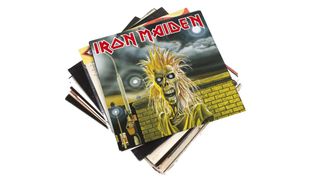
3. Iron Maiden - Iron Maiden (1980)
“My first memory of them was buying the first record and taking the record home and hearing Prowler, the first song. But the first five Maiden albums, they all kind of mean the same to me in a lot of ways. I could say, ‘Well, the first one’s super-special because it’s the first one’, but then three albums later you’re on Piece Of Mind and it means just as much.
“That whole period of my life from 1980 through ’85 and how much Maiden meant to me in that time period, there’s no way to really quantify it. They meant everything to me. I already had a passion for hard-rock music and what was soon to be called metal, but Maiden, really, for whatever reason, that really was the band for me that really made me fall in love with it.
“And it became something that I couldn’t live without. More so than Priest, more so than AC/DC, they were the band that really kind of took over my life in every way, shape and form.”
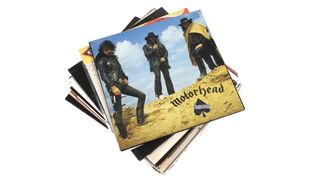
4. Motörhead - Ace Of Spades (1980)
“1980 was a big year because, as well as Maiden, I also heard Black Sabbath’s Heaven And Hell and Motörhead’s Ace Of Spades, too. It’s still my favourite Motörhead album.
“I got to meet my hero Lemmy in 1985 and become friends with him. He was someone that if I saw him somewhere I could actually go say hello, ask him how he was and sit down and have a conversation, and not have it be awkward. That was so important to me because I know tons of people that I’ve met over the years - heroes in bands. And everything’s great and I could say hello, but it’s not like I’m friends with everybody.
“But Lemmy I actually became friends with over time. Because we did get to spend actual time together on tour. So it was a different story, and the fact he was so accommodating and just so aware, I think, of what he meant to people without ever being weird or thinking he was above you in any way, shape or form. He truly was a great human being to be around.”
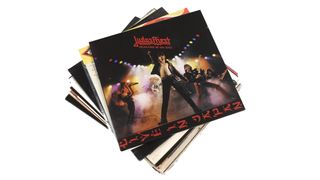
5. Judas Priest - Unleashed In The East (1979)
“I definitely heard Priest before Maiden, because Maiden was 1980 and Priest was a year before that at least. My first Priest record was either Unleashed In The East or Stained Class. I certainly consider them to be the first real metal band that I got into.
“As much as I like Sabbath and everything else, I was well into it by the time I was 14 or 15, but Priest was the next generation and the older kids that I knew, they weren’t really into Priest. They were more Sabbath and Zeppelin, Pink Floyd, Jimi Hendrix. They were more into that scene; that was definitely more of a stoner thing. Whereas Priest was way more aggressive than anything that came before it.
“So, as a kid, that’s what I was looking for. Me and my friends that would sit there at lunch in school; we were always looking for the next in your face thing and goddamn, that’s what Priest were!
“I hadn’t heard Thin Lizzy yet; I’d heard The Boys Are Back In Town, but I didn’t know their catalogue at that point. So, for me, Priest were the first real dual guitar thing. That opened my eyes and ears to so much. And Halford, I’d never heard singing like that before. Freddy Mercury was certainly operatic, but obviously Priest was so much more metal and aggressive than Queen were. Priest were right time, right place for me.”
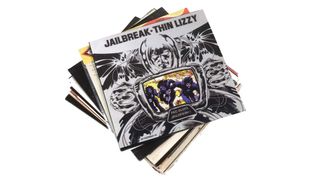
6. Thin Lizzy - Jailbreak (1976)
“I was well into Maiden before I delved into Thin Lizzy. They were one of those bands I always heard about, and certainly by ’80/’81 I knew the obvious songs, but I had never really jumped into the catalogue yet.
“And something that came later for me was appreciating Phil Lynott’s storytelling ability, too. Whereas in ’80/’81, I wasn’t really paying too much attention to what people were saying; it was more an overall feeling. Once I started paying attention to the lyrics, Phil became one of my favourites.”
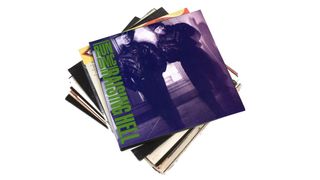
7. Run DMC - Raising Hell (1986)
“Even before The Beastie Boys, Rick Rubin was already sampling guitars on LL records. And there were already heavy guitars being played and/or sampled on Run-DMC records. There was just something about that sound: these really kind of heavy voices rapping over guitars and heavy beats. There was just something about it, and even before The Beastie Boys, I was already feeling that.
“It started for me with listening to Run DMC and LL Cool J, and The Beastie Boys way, way early. Anything that was coming out in ’81/’82… stuff like Whodini. It was mainly Run DMC and LL from the early stuff, that’s what really caught me. I started college in the fall of ’81 at St John's University, ironically the same place DMC [Darryl McDaniels] was going. Although, I never saw him around, I don’t know if he’d started going then or was ahead of me.
“At one point, I would listen to Iron Maiden and Run DMC on a constant loop on my Walkman all the time. It moved me in the same way. It filled a void in my soul that music fills. I can’t tell you why, it just did.”
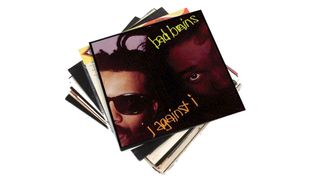
8. Bad Brains - I Against I (1986)
“They’re a shared influence for Anthrax, for sure. Starting around ’82, certainly hardcore became a big part of our lives, as well. Bad Brains were a bit part of that with the early hardcore stuff, even before I Against I when the sound changed a bit. I love that record as much as any Bad Brains record.
“I loved them; I loved their approach to music, because they weren’t afraid to try anything. There was a fearlessness to what they were doing that certainly rubbed off on Anthrax.”
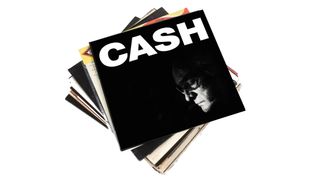
9. Johnny Cash - American IV: The Man Comes Around (2002)
“During most of the '80s, I wasn’t listening to anything but metal and rap music. It all had a certain feeling and aggression, but at the same time, old country music moves me in that same way.
“When you listen to Johnny Cash singing about killing a man, you believe him. Johnny Cash is much darker and harder to me than black metal. Because it’s so real. Hank Williams was real. There’s an energy in it that moves me in the same way as Slayer.
“I don’t have all the [American Recordings] albums, but this is one I listen to quite a bit. His cover of Hurt is spine-chilling. It’s one of the best songs I’ve ever heard. I already liked that song when it was a Nine Inch Nails song, and then Johnny Cash, there’s just something about his take on it and his voice; it’s the sound of the apocalypse to me.”
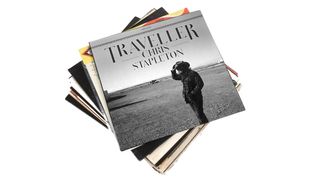
10. Chris Stapleton - Traveller (2015)
“It’s nice to hear country music that sounds like country music. I’ve been a fan of country music since I was a kid - I probably heard Johnny Cash before I ever heard anything remotely considered hard rock, because you’d see Johnny Cash on TV all the time, and I just always thought he was cool. I mean, how could you not?
“Stuff like that has been ingrained in my psyche since I was a child. So, for me, real country music has nothing to do with most of the country music that has been made in America in the last 10-15 years. It just became manufactured pop music with a different look. So it’s nice to hear something that harkens back to real country or blues - it all comes from the same place.
“If you listen to old Hank Williams, it all goes back to the blues. That’s really all it is: he’s singing the blues with more of a twang to it. And that’s what I hear when I hear Sturgill Simpson and Chris Stapleton; I hear something that sounds real to me. I would highly recommend Chris Stapleton if you want to hear somebody singing about real life.”
Don't Miss

Rob is the Reviews Editor for GuitarWorld.com and MusicRadar guitars, so spends most of his waking hours (and beyond) thinking about and trying the latest gear while making sure our reviews team is giving you thorough and honest tests of it. He's worked for guitar mags and sites as a writer and editor for nearly 20 years but still winces at the thought of restringing anything with a Floyd Rose.

"It may have bothered him that people didn’t recognise his guitar virtuosity, which might be why the song devotes so much space to his shredding": A music professor breaks down the theory behind Prince's When Doves Cry

“It didn’t even represent what we were doing. Even the guitar solo has no business being in that song”: Gwen Stefani on the No Doubt song that “changed everything” after it became their biggest hit

"It may have bothered him that people didn’t recognise his guitar virtuosity, which might be why the song devotes so much space to his shredding": A music professor breaks down the theory behind Prince's When Doves Cry

“It didn’t even represent what we were doing. Even the guitar solo has no business being in that song”: Gwen Stefani on the No Doubt song that “changed everything” after it became their biggest hit
Most Popular







